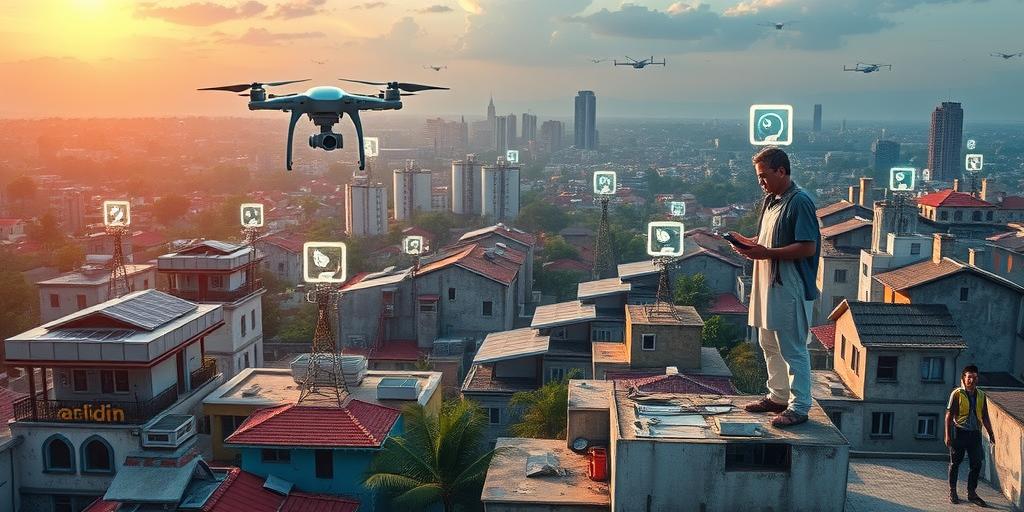The Impact of Emerging Technologies on Developing Nations
Emerging technologies are rapidly reshaping the global landscape, and their impact on developing nations is particularly profound. These technologies, ranging from artificial intelligence (AI) and blockchain to advanced biotechnology and renewable energy solutions, offer unprecedented opportunities for economic growth, social development, and improved quality of life. However, they also present significant challenges that must be addressed to ensure equitable and sustainable progress.
Opportunities
Economic Growth:
- Digital Economy: E-commerce, digital services, and online platforms can create new markets, stimulate entrepreneurship, and generate employment opportunities, especially for young people.
- Automation and Manufacturing: Advanced technologies can enhance productivity, improve efficiency, and attract foreign investment in manufacturing and other industries.
- Financial Inclusion: Fintech solutions, such as mobile banking and digital payment systems, can extend financial services to underserved populations, fostering economic empowerment and reducing poverty.
Social Development:
- Healthcare: Telemedicine, AI-powered diagnostics, and mobile health applications can improve access to healthcare services, particularly in remote and underserved areas.
- Education: Online learning platforms, digital educational resources, and virtual classrooms can expand educational opportunities, enhance learning outcomes, and bridge the education gap.
- Agriculture: Precision farming, drone technology, and data analytics can optimize agricultural practices, increase crop yields, and improve food security.
Infrastructure Development:
- Renewable Energy: Solar, wind, and other renewable energy technologies can provide clean, affordable, and decentralized energy solutions, reducing reliance on fossil fuels and mitigating climate change.
- Smart Cities: IoT-enabled infrastructure, intelligent transportation systems, and data-driven urban planning can improve urban services, enhance resource management, and create more livable cities.
Challenges
Digital Divide:
- Access and Affordability: Limited access to internet connectivity, digital devices, and affordable data plans can exacerbate existing inequalities and exclude marginalized communities from the benefits of the digital economy.
- Digital Literacy: Lack of digital skills and awareness can hinder the adoption and effective use of new technologies, limiting their impact on development.
Regulatory and Policy Frameworks:
- Innovation and Regulation: Inadequate or outdated regulatory frameworks can stifle innovation, create uncertainty for businesses, and hinder the deployment of new technologies.
- Data Governance: Weak data protection laws and cybersecurity measures can expose individuals and organizations to privacy risks, data breaches, and cyber threats.
Social and Ethical Considerations:
- Job Displacement: Automation and AI-driven technologies can displace workers in traditional industries, requiring investments in retraining and skills development to mitigate job losses.
- Bias and Discrimination: Algorithmic bias in AI systems can perpetuate and amplify existing social inequalities, leading to discriminatory outcomes in areas such as employment, finance, and criminal justice.
- Ethical Dilemmas: Emerging technologies raise complex ethical questions related to privacy, autonomy, and human rights, requiring careful consideration and proactive measures to address potential harms.
Strategies for Developing Nations
Investing in Digital Infrastructure:
- Expanding internet access through public-private partnerships and community-based initiatives.
- Promoting digital literacy and skills development through education and training programs.
Developing Supportive Regulatory Frameworks:
- Adopting flexible and adaptive regulatory frameworks that encourage innovation while protecting consumers and promoting competition.
- Establishing clear data protection laws and cybersecurity standards to ensure responsible data governance.
Promoting Inclusive and Sustainable Development:
- Investing in education, healthcare, and social safety nets to address inequalities and promote human development.
- Prioritizing sustainable and environmentally friendly technologies to mitigate climate change and protect natural resources.
Fostering International Collaboration:
- Engaging in international partnerships and knowledge-sharing initiatives to leverage global expertise and resources.
- Participating in global forums and standard-setting bodies to shape the development and deployment of emerging technologies.
Conclusion
Emerging technologies hold immense potential to accelerate development and improve the lives of people in developing nations. By addressing the challenges and adopting proactive strategies, these countries can harness the power of technology to achieve sustainable and inclusive growth, create new opportunities, and build a brighter future for all.









